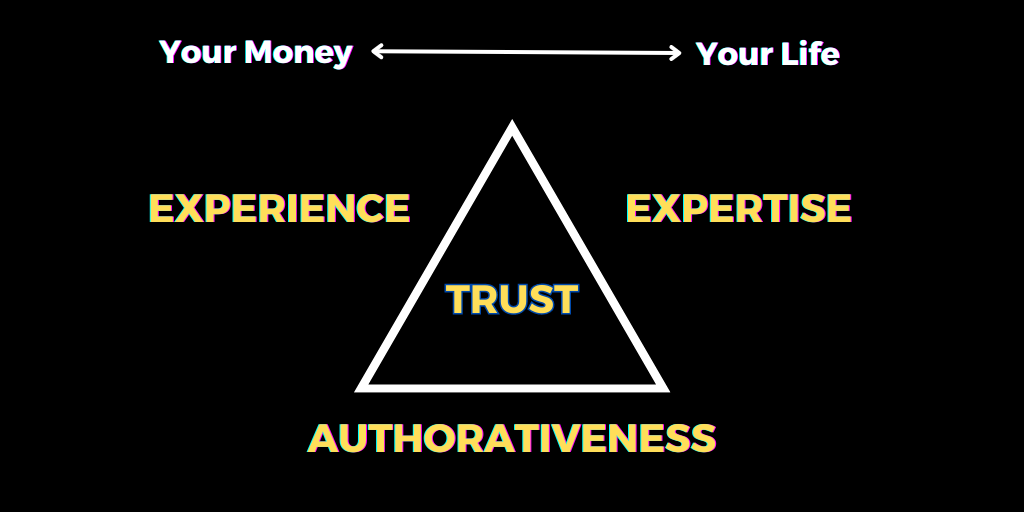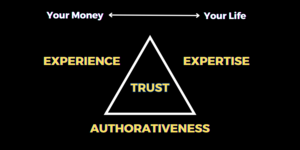This series is based on a long-form post entitled: “How Google Really Evaluates Law Firm Websites in 2025 (and 4 Changes You Must Make)”. You can check it out via this link.
Why Your Firm's Online Credibility Matters More Than Ever
When a family faces the sudden loss of a loved one, or when a couple decides to divorce, their first instinct isn’t usually to flip through the Yellow Pages. They turn to Google. And in that vulnerable moment, searching for “estate planning attorney near me” or “divorce lawyer,” they’re not just looking for legal expertise—they’re looking for someone they can trust.
Google understands this. That’s why their 2025 evaluation system goes far beyond keywords and backlinks. Today, search engines prioritize trust, transparency, and demonstrated experience. This shift is driven by two critical frameworks that now heavily influence where your firm appears in search results: EEAT and YMYL.
For law firms serving families through estate planning, elder law, family transitions, and financial crises, these aren’t just technical SEO requirements. They’re digital reflections of the trust-based relationships you build every day with your clients.
You can’t build trust without first earning attention—and then backing it up with proof.
David Adams, Sirus Digital Tweet
Understanding EEAT: The Trust Signals Google Values
EEAT stands for Experience, Expertise, Authoritativeness, and Trustworthiness—four qualities that search engines now use to evaluate legal websites. But these aren’t arbitrary metrics. They mirror exactly what your clients seek when choosing an attorney:
Experience: Beyond Academic Credentials
Google wants to see that you’ve actually walked alongside clients facing similar challenges. This means demonstrating real-world insight into the problems your clients face, not just theoretical knowledge.
For example: Instead of simply stating “We handle estate planning,” a high-experience website might explain, “We’ve helped over 200 families navigate the complexities of blended family estate planning, including step-children, multiple marriages, and business succession concerns.”
Expertise: Qualified Legal Authority
Your expertise encompasses your formal qualifications, specialized training, and focused practice areas. Google’s algorithms look for clear indicators that you’re qualified to provide legal guidance in your specific field.
EEAT for attorneys means showcasing bar admissions, certifications, continuing education, and specialized training that directly relates to your practice areas.
Authoritativeness: Recognition by Others
True authority isn’t self-proclaimed—it’s recognized by peers, professional organizations, and the community you serve. This includes citations in legal publications, speaking engagements, professional memberships, and community involvement.
Trustworthiness: The Foundation of Everything
Trustworthiness encompasses accuracy, transparency, and security. For legal websites, this means providing current information, clear contact details, secure browsing experiences, and honest representation of your services.
In a high-stakes industry like law, trust isn’t a luxury. It’s the doorway.
Legal Marketing Maxim Tweet
Why YMYL Standards Matter for Your Practice
YMYL stands for “Your Money or Your Life”—Google’s designation for content that could significantly impact someone’s financial security, legal rights, or overall well-being.
If you’ve ever guided a family through probate proceedings or helped someone understand their rights during a divorce, you know exactly why this designation exists. Legal advice isn’t just information—it’s guidance that can change lives, protect assets, and preserve family relationships.
The Higher Standard for Legal Content
Google applies stricter evaluation criteria to YMYL content because poor legal information online can cause real harm. Consider these scenarios:
- Incomplete estate planning advice that leaves families vulnerable
- Outdated divorce law information that misleads someone about their rights
- Bankruptcy guidance that fails to mention critical deadlines or procedures
When Google holds legal websites to higher standards, it’s protecting the same vulnerable people you serve every day. By aligning with these standards, you’re not just improving search rankings—you’re reinforcing your commitment to responsible, ethical practice.
How Google Evaluates Legal Practices in 2025
The digital landscape has evolved significantly, and Google now evaluates your firm’s credibility across multiple channels. Understanding these changes helps you meet potential clients wherever they’re searching for guidance.
Traditional Search Results Get Smarter
Law firm website trust signals now carry significant weight in search rankings. Firms that demonstrate strong EEAT consistently see:
- 40-60% more organic traffic growth compared to competitors
- Better placement in local map packs and featured snippets
- Increased visibility for unbranded searches like “estate planning attorney”
This isn’t about gaming the system—it’s about authentically representing your expertise in ways that both search engines and potential clients can recognize.

AI Tools Are Changing the Game
Your future clients increasingly turn to AI assistants like ChatGPT, Perplexity, and Gemini for initial legal guidance. These tools now actively source answers from websites that demonstrate clear EEAT signals.
When you publish content with named authors, detailed credentials, and transparent sourcing, you increase the likelihood that AI tools will reference your expertise when someone asks about estate planning or family law questions.
Practical insight: This is why updating attorney bios with current bar memberships and adding clear authorship to articles isn’t just good practice—it’s becoming essential for digital visibility.
Social Media Mirrors Search Standards
While LinkedIn and Facebook don’t use Google’s exact EEAT algorithm, they’ve developed similar systems that prioritize credible, trustworthy content. Posts from verified professionals with established expertise get shared 2-4x more frequently in legal communities.
This creates a positive cycle: strong EEAT signals improve search visibility, which enhances social media credibility, which drives more referrals back to your practice.
The Real-World Connection: Why This Matters Beyond SEO
Here’s what makes legal SEO 2025 different from previous years: these digital trust signals align perfectly with the qualities that make attorneys successful in real life.
Think about your most successful client relationships. They’re built on:
- Understanding what clients are truly experiencing
- Demonstrating your qualifications to handle their specific situation
- Earning recognition from peers and the community
- Providing transparent, honest guidance
EEAT and YMYL aren’t just SEO metrics—they’re digital reflections of excellent legal practice. When you optimize for these signals, you’re not just improving your search rankings. You’re ensuring that your online presence accurately represents the trust-based relationships you build with every client.
What This Means for Your Practice
The firms that thrive in 2025 won’t be those that chase the latest SEO tricks. They’ll be practices that authentically demonstrate their expertise, experience, and commitment to client service—both online and off.
The good news? If you’re already providing excellent legal services, you have everything you need to succeed with these new standards. The challenge is ensuring your digital presence reflects the quality and care that defines your practice.
Coming Up: Turning Experience into Digital Authority
Now that you understand why EEAT and YMYL matter, the next question is: how do you authentically showcase your experience online without sounding promotional?
Next in this series: “Credibility Is the New Currency: Building a Legal Website That Converts and Ranks” — We’ll explore practical strategies for transforming your years of practice into compelling, trust-building content that resonates with both search engines and potential clients.
If it looks outdated, they assume your thinking is too.
Sirus Digial (paraphrase) Tweet
Ready to align your digital presence with your reputation? Sirus Digital specializes in helping estate planning, elder law, and family law practices build sustainable, high-trust visibility through strategic SEO and client-focused content. Contact us to learn how we can support your practice’s growth with integrity and authenticity.
This is the first of a four-part series from Sirus Digital designed to help legacy-minded law firms build a trusted online presence by aligning with Google’s EEAT (Experience, Expertise, Authoritativeness, and Trustworthiness) and YMYL (Your Money, Your Life) standards.
- The Digital Credibility Framework Every Law Firm Must Understand in 2025
Understand the fundamentals of EEAT and YMYL and why they matter more than ever for legal professionals. - Credibility Is the New Currency: Building a Legal Website That Converts and Ranks
Explore the website signals that influence both search engines and prospective clients—and how to get them right. - What You Must Change on Your Website Right Now
A practical guide to the most common law firm website mistakes—and how to correct them fast. - Smarter Law Firm Marketing: Tools That Build Trust and Free Your Time
Discover tools and techniques that elevate your digital presence while giving you back time for client work.



